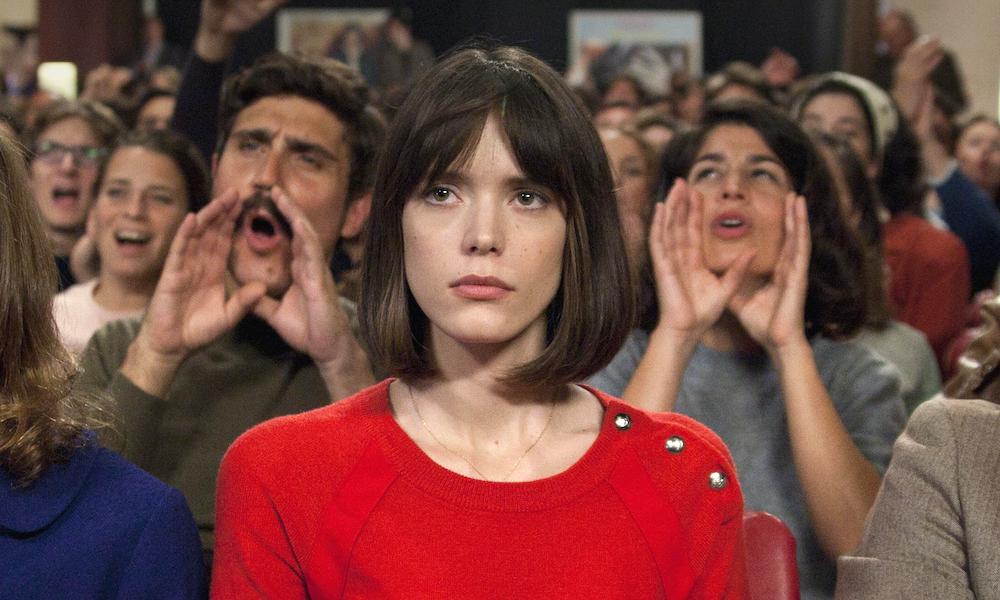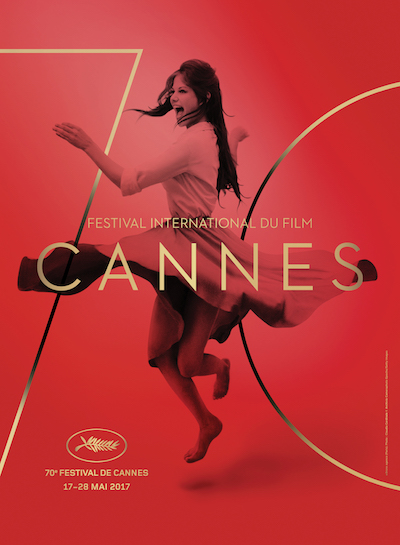Redoutable: An interview with Stacy Martin

Stacy Martin stars as the actress and novelist Anne Wiazemsky in Michel Hazanavicius’s latest feature, Redoubtable. The film follows Wiazemsky’s relationship with the director Jean-Luc Godard in the 1960s.
How did you become involved in Michel Hazanavicius’s project?
I went through a very official casting procedure, then Michel called and asked me to do a test with Louis (Garrel), probably to check how things worked between us. Michel called me after that to tell me he wanted to work with me. We saw each other and talked a lot, he told me that his intention wasn’t to make a biopic but a comedy about Godard, and he gave me Anne Wiazemsky’s books, in which she tells their story.
What did you know about Anne Wiazemsky?
I knew Anne through her films. Several years ago, I saw Au Hasard Balthazar at an independent cinema in London, and it moved me deeply. The story is both simple and profound. Anne is extremely beautiful in it: pure and sensual at the same time. It left its mark on me.
And Godard?
I’d seen his films, at least two from that period. I watched Une Femme Mariée again and was completely captivated, I really think it’s one of his best. I re-watched others again and a lot of Truffaut films too.
Really? Why Truffaut?
For the era, the way people talk, the way they move, the way they behave. To help me find a texture, a tone. Godard’s films are completely re-written in the editing, which makes it difficult to get direct inspiration without falling into caricature. I needed something more natural, more everyday and Truffaut’s films were very useful for this.
Have you met Anne Wiazemsky?
No…not yet! I really have to meet her now. Especially since I know she saw the film and liked it. I hope she will be at Cannes. I was hesitant before the shoot, I wondered or not I should meet her. But I was so taken by her book, and Michel’s adaptation of it, that I wanted to discover something by myself. And on top of that, I’m a big fan of her work and was a bit afraid of meeting her! (laughs). Deep down I was concerned that it would influence me too much, that by having such a direct reference, I’d lose some artistic curiosity. There was so much information in the book and the screenplay; I wanted to find something else, something of my own. Especially since she doesn’t have so much dialogue. So much is said through her eyes, her way of being, of listening…That’s the risk we took with Michel, and very quickly, after a week or two of shooting, we knew that it was working…
Now that you’ve played Anne’s character, how would you define it?
(Laughs) To me, Anne was from a very young age witness to a quite incredible world, a defining chapter of French cinema. But she was also a becoming a woman, profoundly questioning the love of her life as well as her work, her own artistic aspirations, the life she intended to live….
What do you find the most touching about her?
The way she looks at their story and at everything that happened. It isn’t so easy to revisit in writing a relationship that was sometimes difficult. She is always very tender when it comes to Godard. Even when she talks in a negative way, and this touches me deeply as it shows the love they had for each other. It’s difficult sometimes to look with tenderness at someone you have loved, who has changed a lot and became someone else. It’s as if love had changed but somehow survived… Her writing shows a combination of gentleness, intimacy and lucidity that Michel has managed to recreate wonderfully, through his direction of the cast but just as much through his narrative ability. We are truly with this couple, completely caught up in their story; it’s funny at the beginning and grows more moving as time passes before becoming melancholy – it’s also the story of the end of a love affair… What really moves me is Anne’s evolution. From the time of her meeting with Godard, also without doubt because of him, she changed, grew, studied, and discovered more of herself. It is also set in an era of turmoil, everything is changing, culturally but also for women, and this obviously resonates in her. Furthermore, in relation to Godard himself – as she says at the end, “He didn’t die that day, but something in him died forever” – she had also fallen in love with an artist who became another. When the artist becomes another artist, does he become another person? The beauty of this film is that it also raises all these questions.
What is, in your opinion, Louis Garrel’s greatest asset for portraying Godard?
He has so many it’s hard to choose only one! (laughs). Given the cult around Godard in France, it was a huge challenge, but that didn’t scare him. At the same time, Louis is very humble and worked very, very hard. The greatest thing he achieved is that he didn’t turn him into a caricature. He is a man. With all the surprises this implies. We went much further than a simple biopic. It really is an interpretation of Godard, in the true sense of the word. It was really hard, but he got it right. He makes him humble, and it really becomes a love story between a man and a woman. It isn’t the case that we forget Godard and Wiazemsky, but we are with them, we become attached to them as human beings and not only as “icons”, and I find this very beautiful…
What was it like acting opposite Louis Garrel?
I loved watching him work, and I loved working with him. He’s awesome! (laughs) And he’s very, very funny. He is extremely inventive, attentive as well, and he’s always looking for a joke, a way to make people laugh… Really attentive.
How would you define Michel Hazanavicius as a director?
Michel has the same kind of freedom children have when they draw before…before they’re told how to do it! They have beautiful creative freedom. They have such fun discovering things; they’re always searching. Michel’s a bit like that, very free, almost childlike, yet extremely precise when it comes to framing, to the image, the colours, and the performances. It was the first time I worked like this, where each texture, each composition mattered, like in painting. I remember one very long and difficult scene where we were really struggling, nothing was working. Suddenly, in the middle of the scene, Michel cuts, says nothing, walks past us, adjusts the curtain behind us: the frame wasn’t straight and was destabilising the whole image! Just like that he managed to relieve the pressure, he reminded us that we were in a film, we were also elements of that image, and we felt freer as a result… Working with him has certainly given me a new kind of liberty.
Did he talk much about the character or the era, while shooting?
We had many discussions beforehand, did quite a lot of reading, we met many times, we discussed cinema, we did tests and a lot of costume research. So much so that once we started shooting everything quickly fell into place and we didn’t need to talk about the characters much…
Was there a scene you were particularly anxious about?
All the demonstration scenes. Because of the crowd, the number of people involved. It was one of the first times I’d been on a set without so many extras… there were running scenes, a few quite violent scenes, and others with a lot of real dialogue. I was anxious about this combination of genres.
What was the biggest challenge for you?
To stay on track, the film’s track as well as the track of Anne’s book. It could have very easily fallen into caricature or mockery, which wasn’t Michel’s intention at all. We moved forward with care…
Off the top of your head, any favourite scenes?
All the restaurant scenes. They have beautiful energy, which wasn’t particularly obvious. Each character has a different dynamic, and I find that they truly represent what we shot, even though they weren’t the easiest to act. The scene where they are naked while discussing the problem of nudity in films also makes me laugh a lot!
If you could keep only one image, one moment from this adventure, what would it be?
I think the scene in the car, when they’re coming back from Cannes.
Why?
Because it was hard to shoot. It was a one shot scene… and it was very hard not to laugh! I didn’t really have much dialogue, I was a bit of an observer, and it was incredible to watch such a furious debate take place in such a tiny car. It was also very hot and we were all crammed together. We had to do at least 30 takes. It was during the very early days of the shoot; instead of giving us a big talk beforehand, Michel played us part of the score from The Magnificent Seven on set! Right away, a team spirit emerged. We all immediately felt that we were part of – not a family, since there isn’t such a creative spirit in a family! – but a troupe. It was warm and creatively very stimulating.
The editorial unit
Read our review of Redoutable here.
Read more of our reviews from the festival here.
For further information about Cannes Film Festival 2017 visit here.




















Facebook
Twitter
Instagram
YouTube
RSS